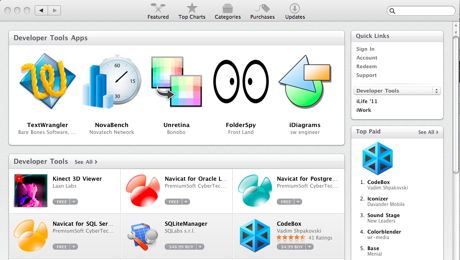Apple's Mac App Store arrives and the world doesn't end


My biggest surprise was finding Developer Tools, right near the top of the list of 21 categories. Hello? From that I assume that Apple expects everyone — from the newbie switcher from Windows to a Macintosh developer — will look to the App Store for something worthwhile.
Developers are wondering how to address the restrictions, aka "guidelines," that Apple places on App Store apps. I've talked with a number of them and each is taking different tacks: Some looking to change the feature list of a current product to meet the requirements, others considering a new title altogether. (On the Apple developer portal, the actual list of requirements is restricted to members of the Apple Developer Program, but you find the PDF here.
In late December, By5's The Conversation podcast featured developer Dave Nanian, founder of Shirt Pocket Software, which makes a number of titles including the excellent SuperDuper! system cloning software.
[Note: I own several licenses of SuperDuper! that I purchased at full price. I have used the product for many years and still use it daily (in addition to Time Machine, btw).]
Host Dan Benjamin spoke to Nanian about a wide range of topics, including Mac developer issues and the elephant in the room, the then-forthcoming Mac App Store, as well as competition to Apple's iOS platform from Google Android OS-based tablets and phones.
Of course, Nanian's SuperDuper! isn't in the Mac App Store and never will be, unless some minds change down in the upper floors of Apple's headquarters. Many, if not all, heavy-duty utility software titles will be bared from entry. Nanian said that it was understandable that Apple would want to prevent users from "doing anything bad." That "bad thing" in this case relates to the deep privileges given to the software.
"That's one of the wonderful things about [Mac] OS X, if you don't actually authorize something specifically to do scary things, scary things can't really happen," Nanian said. "SuperDuper! by its very nature needs to get access to every file on your drive otherwise it wouldn't be much of a backup. And to do that you need to escalate its privileges up to where it could destroy your system — sort of."
"Apple doesn't want that kind of thing in the App Store. I understand that."
The ?Mac App Store rule in question is in Section 2. Functionality, line 27:
2.27 Apps that request escalation to root privileges or use setuid attributes will be rejected.
Still, Nanian said that he wished there was a "reasonable way" for Apple to give visibility to software like his. He decried the removal of the older software lists that were provided from under the Apple Menu.
On the so-called Gold Rush for developers in the new Mac App Store, Nanian warned developers trying to get into the store "no matter what" and changing their software to meet the guidelines of the App Store.
That [process] may not always results in a better product, it results in a product that meets the guidelines," he said.
Nanian makes an excellent point for developers. Some of them will be able to work under the restrictions and make a great product, others won't. Some categories will be more amenable to the guidelines. Putting out a lackluster product do any good for anyone, users nor developers.
Until we're told different, the Mac App Store is just one more way to discover programs. I can think of some better, not counting the Apple Core. More on that later.